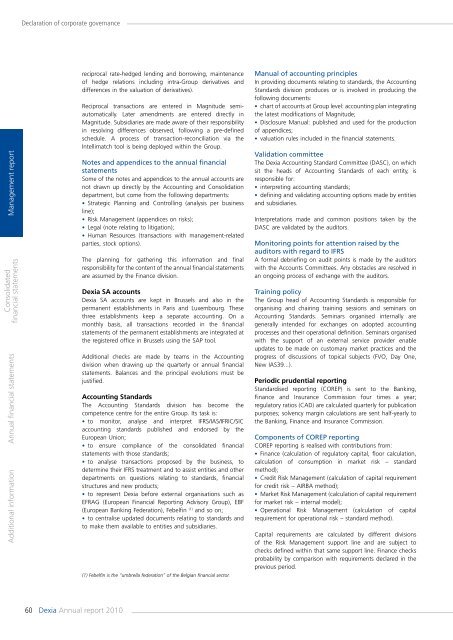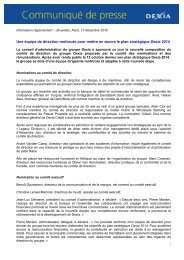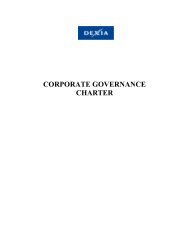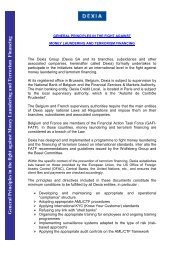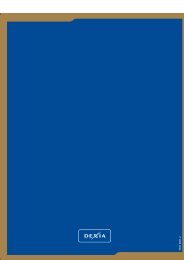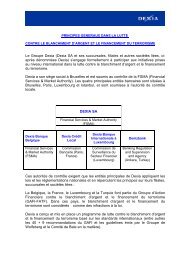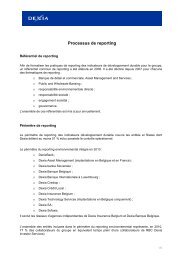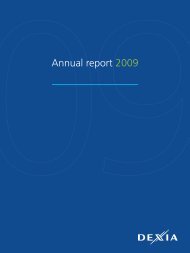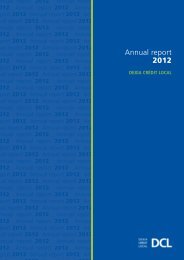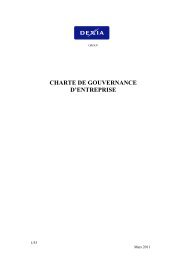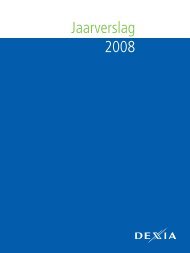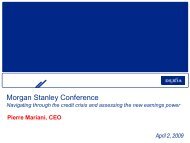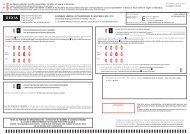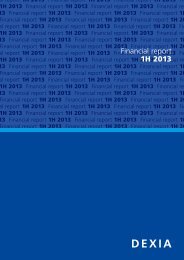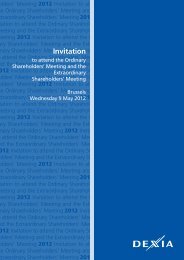Annual report 2010 - Dexia.com
Annual report 2010 - Dexia.com
Annual report 2010 - Dexia.com
- No tags were found...
Create successful ePaper yourself
Turn your PDF publications into a flip-book with our unique Google optimized e-Paper software.
Declaration of corporate governanceManagement <strong>report</strong>Consolidatedfinancial statementsAdditional information <strong>Annual</strong> financial statementsreciprocal rate-hedged lending and borrowing, maintenanceof hedge relations including intra-Group derivatives anddifferences in the valuation of derivatives).Reciprocal transactions are entered in Magnitude semiautomatically.Later amendments are entered directly inMagnitude. Subsidiaries are made aware of their responsibilityin resolving differences observed, following a pre-definedschedule. A process of transaction-reconciliation via theIntellimatch tool is being deployed within the Group.Notes and appendices to the annual financialstatementsSome of the notes and appendices to the annual accounts arenot drawn up directly by the Accounting and Consolidationdepartment, but <strong>com</strong>e from the following departments:• Strategic Planning and Controlling (analysis per businessline);• Risk Management (appendices on risks);• Legal (note relating to litigation);• Human Resources (transactions with management-relatedparties, stock options).The planning for gathering this information and finalresponsibility for the content of the annual financial statementsare assumed by the Finance division.<strong>Dexia</strong> SA accounts<strong>Dexia</strong> SA accounts are kept in Brussels and also in thepermanent establishments in Paris and Luxembourg. Thesethree establishments keep a separate accounting. On amonthly basis, all transactions recorded in the financialstatements of the permanent establishments are integrated atthe registered office in Brussels using the SAP tool.Additional checks are made by teams in the Accountingdivision when drawing up the quarterly or annual financialstatements. Balances and the principal evolutions must bejustified.Accounting StandardsThe Accounting Standards division has be<strong>com</strong>e the<strong>com</strong>petence centre for the entire Group. Its task is:• to monitor, analyse and interpret IFRS/IAS/IFRIC/SICaccounting standards published and endorsed by theEuropean Union;• to ensure <strong>com</strong>pliance of the consolidated financialstatements with those standards;• to analyse transactions proposed by the business, todetermine their IFRS treatment and to assist entities and otherdepartments on questions relating to standards, financialstructures and new products;• to represent <strong>Dexia</strong> before external organisations such asEFRAG (European Financial Reporting Advisory Group), EBF(European Banking Federation), Febelfin (1) and so on;• to centralise updated documents relating to standards andto make them available to entities and subsidiaries.(1) Febelfin is the “umbrella federation” of the Belgian financial sector.Manual of accounting principlesIn providing documents relating to standards, the AccountingStandards division produces or is involved in producing thefollowing documents:• chart of accounts at Group level: accounting plan integratingthe latest modifications of Magnitude;• Disclosure Manual: published and used for the productionof appendices;• valuation rules included in the financial statements.Validation <strong>com</strong>mitteeThe <strong>Dexia</strong> Accounting Standard Committee (DASC), on whichsit the heads of Accounting Standards of each entity, isresponsible for:• interpreting accounting standards;• defining and validating accounting options made by entitiesand subsidiaries.Interpretations made and <strong>com</strong>mon positions taken by theDASC are validated by the auditors.Monitoring points for attention raised by theauditors with regard to IFRSA formal debriefing on audit points is made by the auditorswith the Accounts Committees. Any obstacles are resolved inan ongoing process of exchange with the auditors.Training policyThe Group head of Accounting Standards is responsible fororganising and chairing training sessions and seminars onAccounting Standards. Seminars organised internally aregenerally intended for exchanges on adopted accountingprocesses and their operational definition. Seminars organisedwith the support of an external service provider enableupdates to be made on customary market practices and theprogress of discussions of topical subjects (FVO, Day One,New IAS39...).Periodic prudential <strong>report</strong>ingStandardised <strong>report</strong>ing (COREP) is sent to the Banking,Finance and Insurance Commission four times a year;regulatory ratios (CAD) are calculated quarterly for publicationpurposes; solvency margin calculations are sent half-yearly tothe Banking, Finance and Insurance Commission.Components of COREP <strong>report</strong>ingCOREP <strong>report</strong>ing is realised with contributions from:• Finance (calculation of regulatory capital, floor calculation,calculation of consumption in market risk – standardmethod);• Credit Risk Management (calculation of capital requirementfor credit risk – AIRBA method);• Market Risk Management (calculation of capital requirementfor market risk – internal model);• Operational Risk Management (calculation of capitalrequirement for operational risk – standard method).Capital requirements are calculated by different divisionsof the Risk Management support line and are subject tochecks defined within that same support line. Finance checksprobability by <strong>com</strong>parison with requirements declared in theprevious period.60 <strong>Dexia</strong> <strong>Annual</strong> <strong>report</strong> <strong>2010</strong>


